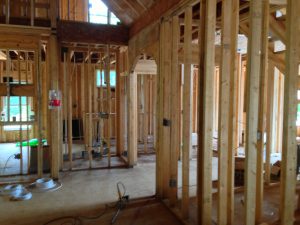 The construction industry is full of risks, and there are several types of contractors insurance to know about to ensure that you’re protected from all the most common hazards.
The construction industry is full of risks, and there are several types of contractors insurance to know about to ensure that you’re protected from all the most common hazards.
What is contractors insurance?
What are the types of contractors insurance?
General liability
Workers’ compensation
Commercial auto
Contractor’s tools and equipment
Professional liability
Builder’s risk insurance
General liability insurance
Third-party property damage
Third-party bodily injury
Copyright infringement and other advertising injuries
Damages caused by your completed construction or installation project
Workers’ compensation insurance
Commercial auto insurance
Contractor’s tools and equipment insurance
Professional liability insurance
Builder’s risk insurance
Fire
Weather
Vandalism
The construction industry is full of risks – and each risk could cost your company money if you don’t have the right insurance coverage in place. Every construction company and contractor should review several types of construction insurance to ensure that they’re protected from all the most common risks.
We’ll let you know which policies you need in your construction and contractor insurance package and how much you can expect to pay.
Construction insurance protects construction companies, general contractors, and property owners from lawsuits, property loss, and other costly hazards.
It’s not a single insurance policy, though. Instead, construction and contractor insurance refers to several different insurance policies that each provide a specific type of protection for your company.
As a construction business owner, you should consider these types of coverage for your company – in fact, some states and client contracts may make purchasing a policy mandatory:
General liability insurance protects against common risks that construction businesses face. These risks include:
Your commercial general liability policy will cover the cost of any lawsuits (including legal fees, settlements, and judgments), medical bills, and property repair and replacement costs if one of these were to happen at your work site. For example, it would cover costs if a client drops by to inspect a construction project, trips on a piece of equipment, and suffers an injury.
Because the risk of physical damage to property and bodily injury is much higher in construction than in other industries, general liability coverage should be an essential part of your construction insurance coverage. Your clients might even require you to carry this coverage.
Make sure your policy includes products-completed operations coverage, also known as product liability insurance. This coverage provides financial protection against lawsuits over property damage or bodily injury caused by your completed work or service, such as a construction defect that later causes an injury.
Workers’ compensation insurance covers medical expenses and lost wages for your employees when they suffer a job-related injury or illness. Most states require any construction company or contractor that has at least one employee to carry workers’ comp insurance.
Construction is a physically demanding industry with a lot of opportunities for injuries. If you or one of your employees were to get hurt on the job and you didn’t have workers’ comp coverage, you could be held responsible for the resulting medical bills and lost wages.
Workers’ compensation insurance protects you, your business, and your employees by covering those expenses. Additionally, employer’s liability insurance, included in most workers’ compensation policies, can help pay for employee lawsuits should a worker blame unsafe working conditions for their bodily injury.
Your company vehicles are an essential part of your construction business, moving both your team and equipment to the job site every day. But they also come with a lot of risks.
An auto accident can get extremely expensive – especially if another person is injured. A commercial auto insurance policy will cover medical bills, legal expenses, and property damage if one of your company trucks is in an accident.
Most states require construction businesses and contractors to carry commercial auto insurance for business-owned vehicles, but the required amount of coverage varies. It’s best to have enough coverage to meet both your state’s requirements and the amount you might expect to pay in an accident.
If your tools are lost, stolen, or damaged, it could cost your company thousands of dollars to repair or replace them. Fortunately, you can buy a contractor’s tools and equipment insurance policy to cover that cost for qualifying equipment.
This policy typically covers tools and equipment that are less than five years old, including hand tools (saws, wrenches, and hammers) and power tools like drills, nail guns, and circular saws. If you need to file a claim for lost, stolen, or damaged tools, your insurance provider will cover the cost to repair or replace them up to your policy limit.
The limit on this coverage is very low for business insurance – typically $10,000. You may need inland marine insurance to insure more valuable property, such as excavators or forklifts. Both policies cover movable equipment that you bring with you to job sites, unlike commercial property insurance which protects a building you own and its contents.
Professional liability insurance protects your construction business from lawsuits over the quality of your work or the work of subcontractors you hired. This policy is also called errors and omissions insurance (E&O).
When you sign a contract with a client, you agree to provide a certain quality of work within an agreed-upon timeframe. If your company can’t meet the deadline or quality standards for the construction project, your client could file a lawsuit against you.
Professional liability insurance covers the cost of any lawsuits over your work, including lawyer fees, court fees, and settlements no matter if you’re at fault or not.
Builder’s risk insurance covers the costs of damage done to a building or structure while it’s still under construction. This damage could be caused by:
While you can get other construction insurance policies to protect equipment and people, most won’t cover an unfinished structure. Builder’s risk insurance fills that gap and ensures that your company isn’t stuck paying for damaged or ruined building materials before it’s even finished.
A builder’s risk insurance policy provides peace of mind to both you and your clients, making it a great addition to your construction and contractor insurance bundle.






Leave A Comment